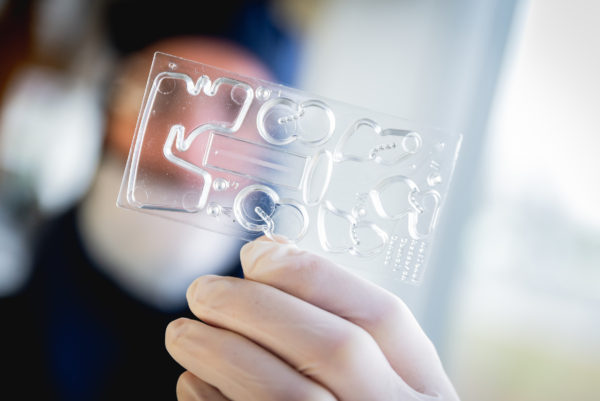What is microfluidics?
Microfluidics is a technology in which fluid is manipulated in engineered, miniaturized devices with features in the micron length scale (10-6 m). The capacity to precisely control fluids at this scale allows for infinite applications in engineering, medicine, biology and chemistry. The technology has delivered spectacular results in recent years, such as digital PCR which is orders of magnitude more sensitive than competing techniques and single-cell genome sequencing which is unlocking the fundamental secrets of the genetic code.
A key driver of the rapid increase in popularity of microfluidic devices has been the development of portable, point-of-care (POC) tests that can be brought to the patient instead of bringing the patient or her/his sample to the lab. Thanks to microfluidics, processes normally carried out in laboratories can now be done on a single chip of few square centimeters (i.e., a lab-on-a-chip), using much less sample and reagents, that generate more precise results in less time, at a higher throughput, and at less cost and energy consumption. The technology has also empowered the development of miniature 3D tissue models (i.e., organ-on-a-chip) and engineered tissue substitutes using microfluidic devices.
Microfluidics in Canada
Since the early 2000s, the University of Toronto, one of Canada’s top research universities, and the National Research Council of Canada, the country’s largest federal R&D organization, have distinguished themselves as international leaders in the science and technology of microfluidic devices for biomedical applications.
University of Toronto (UofT)
The University of Toronto boasts one of the world’s largest and most active microfluidic device research communities: it consists of 50+ investigators who are mentoring 220+ students and postdoctoral fellows. Together they are producing high-impact publications, innovative microfluidics-powered medical devices, intellectual property (IP) and start-up companies. The University’s research community has generated several ‘world-firsts’ such as:
- organ-on-chip models of blood vessels and heart tissues
- a point-of-care diagnostic device for infection diseases validated for use in refugee camp settings in Africa
- a handheld 3D printer that produces skin sheets that promote healing of large burn wounds
National Research Council Canada (NRC)
The National Research Council’s Bio-Analytical MicroNano Devices Section (BioAMND) in Boucherville (Quebec) develops, fabricates and scales up production of polymer-based microfluidic devices for diverse applications, such as diagnostics, precision medicine and cell-based therapy. It is staffed with ~40 scientists who use and operate a $75 million facility. Since its establishment in 2001, BioAMND has conducted >100 device-related R&D and translational projects (valued at >$75M), generating >150 peer-reviewed articles in high-impact journals, 35 patented technologies, and a large collaborative network of industry partners, federal departments and international organizations.
The Council has made unique contributions to the field of polymer micro-fabrication of lab-on-chip systems. A recent example is the ‘PowerBlade’ (P-Blade), a microfluidic lab-on-a-chip technology that can perform DNA, RNA and protein isolation from a fingerprint sample. The P-Blade has been applied to national priorities through partnerships with Health Canada, the Public Health Agency of Canada and the Canada Food Inspection Agency. In addition, it will soon be deployed to the International Space Station through a collaboration between Canadian Space Agency and the Canadian space industry. (see government blog entry about P-Blade)
What is CRAFT?
Recognizing they could have a much greater impact by working together than separately, the National Research Council of Canada and the University of Toronto established a unique and long-term partnership, known as the Centre for Research and Applications in Fluidic Technologies (CRAFT). In 2023, CRAFT expanded to formally include Unity Health Toronto, an academic hospital network and leading Canadian health research institute. Unity’s clinicians and other healthcare professionals are crucial for the co-development, translation and broad adoption of new microfluidic-enabled technologies for health.
Our Vision
CRAFT will strengthen the entire value chain of microfluidic device manufacturing, making Canada a world-leader in creating and deploying microfluidics-enabled medical devices that improve the health of all Canadians.
Our Goals
- push forward the science and technology of microfluidics;
- accelerate the creation, commercialization and adoption of leading-edge microfluidic technologies for biomedical applications;
- provide Canadian graduate students and postdoctoral fellows with unparalleled hands-on learning opportunities in government, private sector and academic labs; and
- stimulate industrial activity for large-scale manufacturing of these technologies in Canada, thereby creating good jobs to help retain talent in Canada.
Locations
CRAFT is based at the University’s St. George campus and Unity’s St-Michael’s Hospital in downtown Toronto, as well as the Council’s Boucherville campus outside of Montreal.

A researcher at the National Research Council of Canada examining a microfluidic device fabricated with a plastic injection machine in CRAFT’s facilities in Boucherville, QC. Photo: NRC-CNRC
Our Community
CRAFT consists of and supports a community of experts from diverse fields and sectors collaborating on R&D projects to develop leading-edge microfluidic devices and deploy them to clinical practice or industry. These experts include researchers employed by the National Research Council of Canada and/or the University of Toronto, clinician-researchers working at Unity Health Toronto or another hospital affiliated with the University, students and postdoctoral fellows at the University and its affiliated hospitals, and meaningfully engaged companies.
Our Resources
CRAFT’s research facilities will include:
- the Device Foundry for rapid prototyping of polymer-based micro/nanofluidic devices and fabrication of up to 1,000 devices for characterization and preclinical and clinical evaluation;
- the Tissue Foundry for preclinical validation of devices;
- NRC’s Integrated Bio-devices Fabrication Facilities for rapid scaling up of device fabrication under certified conditions that can be transferred to industry for large-scale manufacturing
- a translational research station at St. Michael’s Hospital for clinical validation of the devices and their benchmarking against standards of care
CRAFT also offers expert staff supporting R&D activities in its facilities and support for collaborative research projects.
CRAFT’s land aknowledgement
CRAFT is based at the University of Toronto (U of T), the National Research Council Canada (NRC) and Unity Health Toronto, and we wish to acknowledge the land on which these institutions are located.
For thousands of years the land on which U of T and Unity operate has been the traditional land of the Huron-Wendat, the Seneca, and the Mississaugas of the Credit. Today, this land is still the home to many Indigenous people from across Turtle Island.
NRC has offices across Canada which are located on unceded, shared, current and traditional territories of many First Nations, Inuit, and Métis People.
We are grateful to have the opportunity to work on this land, and we pay respect to the peoples who were here long before us. It is our responsibility, in the spirit of reconciliation, to improve our understanding of and relationships with local Indigenous communities and their cultures.


